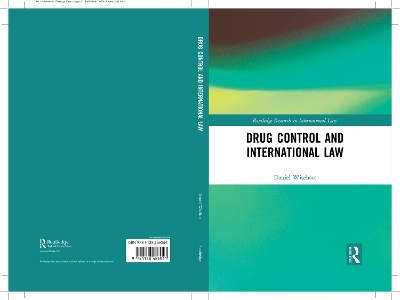
Drug Control and International Law
Routledge (Verlag)
978-0-367-58499-3 (ISBN)
This book provides for an extensive legal analysis of the international drug control system in light of the growing challenges and criticism that this system faces. In the current debate on global drug policy, the central pillars of the international drug control system – the UN Drug Conventions as well as its institutions – are portrayed as outdated, suppressive and seen as an obstacle to necessary changes. The book’s objective is to provide an in-depth and positivist insight into drug control’s present legal framework and thus provide for a better understanding of the normative assumptions upon which drug control is currently based. This is attained by clarifying the objectives of the international drug control system and the premises by which these objectives are to be achieved.
The objective of the current global framework of international drug control is the limitation of drugs to medical and scientific purposes. The meaning of this objective and its concrete implications for States’ parties as well as its problems from the perspective of other regimes of international law, most notably international human rights law, are extensively analysed. Additionally, the book focuses on how the international drug control system attempts to reach the objective of confining drugs to medical and scientific purposes, i.e. by setting up a universal system that exercises a rigid control on drug supply. The consequences of this heavy focus on the reduction of drug supply are outlined, and the book concludes by making suggestions on how the international drug control system could be reformed in the near future in order to better meet the existing challenges.
The analysis occurs from a general international law perspective. It aims to map the international drug control system within a wider context of international law and to understand whether the problems that the international drug control system faces are exemplary for the difficulties that institutionalized systems of global scope face in the twenty-first century.
Daniel Wisehart is an associate at Wach + Meckes LLP, Munich. He has previously worked as a researcher at the Universität Potsdam and the Universität Freiburg and clerked for the European Court of Human Rights.
Acknowledgments
List of abbreviations
1 Introduction
1.1 International drug control after UNGASS 2016: more of the same or towards a fundamental turning point?
1.2 Objectives and methodology of this book
2 The sources and actors of the international drug control system
2.1 The primary sources of the international drug control system
2.2 The institutions of the international drug control system and a typology of their secondary instruments
2.3 Conclusion
3 The emergence of the international drug control system
3.1 Towards one coherent obligation to confine drugs to medical and scientific purposes
3.2 A constant expansion of the international drug control system
3.3 The international drug control system as a prime example of the law of cooperation
3.4 Conclusion
4 The objective of the international drug control system: limitation of drugs to medical and scientific purposes
4.1 The need to understand the limitation of drugs to medical and scientific purposes
4.2 The meaning of the limitation of all drug-related activities to medical and scientific purposes
4.3 Exceptions to the limitation of drugs to medical and scientific purposes within the international drug control system
4.4 Options to deviate from the limitation of drugs to medical and scientific purposes in the international drug control system
4.5 Does international human rights law conflict with the limitation of drugs to medical and scientific purposes?
4.6 Conclusion
5 The material scope of the international drug control system
5.1 Substances limited to medical and scientific purposes
5.2 Modification of the scope of application of the international drug control system (scheduling)
5.3 Prospects for exempting cannabis and the coca leaf from drug control’s scope of application
5.4 The challenge of regulating uncertainty: the rise of new psychoactive substances and the international drug control system
5.5 Conclusion
6 Challenges to the implementation of the international drug control system
6.1 Control of the licit supply chain: achieving a balance between limiting and ensuring an adequate availability of drug supply?
6.2 Suppression of illicit supply: the UN Drug Conventions as a punitive and sanction-oriented system of control?
6.3 Demand-reduction obligations providing for a human- and health-oriented treatment of drug users?
6.4 Fairness and the premise of the international drug control system to limit drugs to medical and scientific purposes by relying on a control of drug supply
6.5 Conclusion
7 Concluding remarks and outlook
Bibliography
Index
| Erscheinungsdatum | 01.07.2020 |
|---|---|
| Reihe/Serie | Routledge Research in International Law |
| Verlagsort | London |
| Sprache | englisch |
| Maße | 156 x 234 mm |
| Gewicht | 453 g |
| Themenwelt | Recht / Steuern ► EU / Internationales Recht |
| Recht / Steuern ► Öffentliches Recht ► Völkerrecht | |
| Recht / Steuern ► Privatrecht / Bürgerliches Recht ► Medizinrecht | |
| Recht / Steuern ► Strafrecht | |
| ISBN-10 | 0-367-58499-9 / 0367584999 |
| ISBN-13 | 978-0-367-58499-3 / 9780367584993 |
| Zustand | Neuware |
| Haben Sie eine Frage zum Produkt? |
aus dem Bereich


